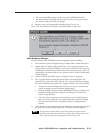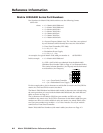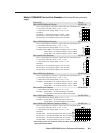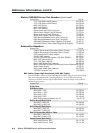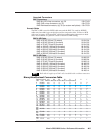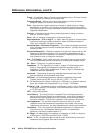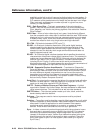
A-9Matrix 3200/6400 Series • Reference Information
Matrix switcher – In audio/video, a means of selecting an input source and
connecting it to one or more outputs. A Matrix switcher would normally have
multiple inputs and multiple outputs.
MHz (as in 8 MHz) – An abbreviation for megahertz. This is a unit of
measurement and refers to a million cycles per second. Bandwidth is
measured in megahertz.
Milli – m – Abbreviation for one thousandth. Example: 1 ms = 1/1000 second.
Monitor – (A) A TV that may receive its signal directly from a VCR, camera or
separate TV tuner for high quality picture reproduction. It may not contain a
channel selector. (B) A video display designed for use with closed circuit TV
equipment. (C) Device used to display computer text and graphics.
Non-Interlaced – Also called progressive scan – a method by which all the video
scan lines are presented on the screen in one sweep instead of two (also
see interlaced).
Nonvolatile memory – Memory that retains data when power is turned off.
NTSC – National Television Standards Committee – Television standard for
North America and certain countries in South America. 525 lines/60 Hz (60
Hz Refresh).
Output – The product of an operation by a device going to some external
destination, such as another device, a video screen, image or hard copy.
PAL – Phase Alternate Line – The phase of the color carrier is alternated from
line to line. It takes four full pictures for the color horizontal phase
relationship to return to the reference point. This alternation helps cancel out
phase errors, the reason the hue control is not needed on PAL TV sets. PAL,
in its many forms is used extensively in Western Europe.
PCB – Printed Circuit Board
Peak-to-Peak – abbreviated p-p – The amplitude (voltage) difference (as
displayed on an oscilloscope) between the most positive and the most
negative excursions (peaks) of an electrical signal.
Peaking – A means of compensating for mid and high frequency RGB Video
Bandwidth response in data monitors and projectors and for signal losses
due to cable capacitance. When using the Peak enhancements, use the
following guidelines for proper output settings: Use 50% with all computer
frequencies between 15-125 kHz at any cable length. Use 100% with high
frequency computers of 36 kHz or higher with cable lengths 75 feet or
greater.
Pincushion – The inward or outward (curved) appearance of the edges of a
display.
Pin-out – An illustration or table that names signals, voltages, etc. that are on
each pin of a connector or cable.
Plenum Cable – Cable having a covering that meets the UL specifications for
resistance to fire.
PLUGE – Picture Line Up Generation Equipment – This is a name of a test
pattern that assists in properly setting picture black level. PLUGE can be part
of many test patterns. The phrase and origination of the test signal are both
credited to the BBC.
Power – Electrical – The dissipation of heat by passing a current through a
resistance. Measured in Watts (W), it is expressed by Ohm’s law from the
two variables: Voltage (E) and Current (I). i.e. P = I
2
xR, or, P = E
2
/R or P =
ExI
Resolution – The density of lines or dots that make up an image. Resolution
determines the detail and quality in the image.
A) A measure of the ability of a camera or television system to reproduce
detail.
B) In video, generally called horizontal resolution. It can be evaluated by



